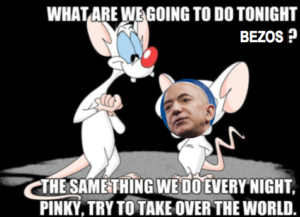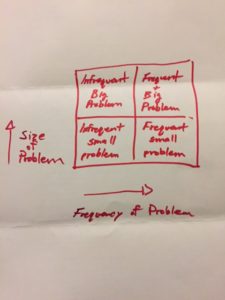Business & Money
I spend a lot of time thinking about what personal project to embark on next. But rather than writing today about any particular idea, I wanted to write about the process of idea generation instead. There’s a lot of conventional wisdom out there regarding how to come up with ideas, some of which seems insightful while some seem utterly useless.
One trope you often see involves working on something that you’re passionate about. And it makes sense. If most ideas will ultimately fail, and those that are successful will take a long time to materialize, you might as well spend time on something you enjoy doing. While it’s hard to argue with this logic, it seems it can also lead you astray. After all, when thinking about the things you’re passionate about, many other people are often passionate about those same things. If you want to work on something related to music, healthy food, taking/sharing photos, entertainment… get in line. Countless other people also love these things and would love to turn it into a lucrative career.
Then you have the “scratch your own itch” idea. May as well work on solving a problem that you experience in your own life. I like this one better than the first. Even if you can’t scale the idea or figure out how to make money, at least you’ve solved a problem for yourself. But again, I think you run into the problem of competition. “I wish there was an app for [insert problem here].” We all have this thought a thousand times a day (at least many of the people I hang out with do). I’d encourage you to set aside twenty minutes one day, Google each of your last 10 “I wish there was an app for….” ideas. There’s probably at least 20 apps that do something very similar, all of which are relegated to oblivion in the app store. So while this one has some value, I’d say you have to go a bit deeper.
Where things really get interesting is with seismic changes in the larger (economic, social, cultural) environment. When a giant asteroid struck the earth 65 million years ago, which happened to coincide with a cataclysmic volcanic eruption, things were poised for change. If you were a giant reptile relying on sunlight to regulate your body temperature (the asteroid collision and eruption blocked out the sun for years), things were not looking so good for you. The environment had quickly changed to favor small mammals. Friendster and myspace were pretty cool, but supercomputers in every pocket allowed Facebook a much better opportunity to succeed. Voice as input has been an attractive proposition for decades, but improvements in natural language processing have finally allowed Apple, Amazon, and Google to bring viable voice assistants to market.
Recognizing these environmental shifts, and being first to market in an area that was previously not possible, seems to me where the most viable businesses can be built.
Human Progress
I often write on VIC about the impact of artificial intelligence. While I’m excited about the possibilities, there are also signs that the “AI for X” trend is getting a bit out of hand. Like this one for example. Do you like Roti (Indian flatbread)? What if you had a robot in your kitchen that could make fresh Roti on demand whenever you wanted? Even better, what if that Roti robot was smart? “Equipped with patented AI technology and intelligent sensors, Rotimatic does all the thinking for you! It makes real-time computations and adapts to every doughball’s characteristics.” AI powered Roti robot, I’d say that definitely solves a first world problem.
Philosophy
There’s one woman on this planet that’s unlike the rest. My mom. She delivered me into the world. Quite literally, my mother gave me life.
Then circumstances changed and I was forced to go live with my Dad’s family at his sister’s house. She was responsible for feeding and housing 7 children (not including me). Without question, my aunt took me in, despite her own plight.
Safe to say that situation was less than ideal. Lucky for me, I had an angel watching over me in my grandmother from my mom’s side. She swooped in at the perfect time to give me a better chance in life. Quite literally, my grandmother saved my life.
While much better, times were still hard. Extremely hard at times. Out of nowhere, one of my best friend’s mom came to the rescue. She often took me to stay at their house when things were challenging at home. Delicious food, a warm bed, the love of an entire family… all were offered in spades. Quite literally, my best friend’s mom changed my life.
I know a lot of incredible mothers out there and I wish you all a Happy Mother’s Day! But for me, it was important to take a second to give thanks to these three in particular. Thanks to you, I am the man I am today.
I may say it far too infrequently, but I owe these women my life!
My Latest Discovery
I’ve written here on VIC before about input/output methods in computing. That is, the methods by which information processing systems communicate with the outside world. The Amazon Echo, and to a lesser extent Google Home and Siri, are showing that voice will be a major input method of the future.
I was thinking about this one night this week and started to reflect on all of the time I spend on computers and how I could speed up my input. By far, the application that consumes the most time on my laptop is email. And most of that time is spent typing new emails.
After a few minutes of Google searching, I discovered that you can hit the function key twice (on a Mac that is), and you can immediately begin using voice dictation as an input method within most applications. The words you speak will begin appearing in the text field. This has been a God send!








